Mayor Robert Maestri
The deadliest hurricane in recorded U.S. history is the Galveston hurricane of 1900. 8000 people died. The second deadliest recorded hurricane happened in 1928, the Okeechobee hurricane, claiming 2500 lives lost like Love's labors. The third deadliest hurricane is the Cheniere Caminada hurricane of 1893.
Hurricane Katrina (always capitalized), by contrast, in 2005, caused 1400 deaths. We are all God's children.
Most inhabitants of Westwego, Louisiana are descendants of refugees from Cheniere Caminada after the big one. It was once a thriving fishing village. Its boats supplied all of New Orleans' finest seafood houses. Antoine's relied on Cheniere Cominada oysters. Though the village was abandoned, the oyster beds around the cheniere continued to be trawled with long rakes. Those were the oysters they served to President Roosevelt.
"How do you like dem ersters, Mr. President?" Mayor Maestri asked his distinguished dinner guest.
A cheniere is a sandy stretch of beach on a ridge.
Robert Sydney Maestri, 53rd Mayor of New Orleans, had a nose that sloped at an exit ramp angle. He served in office for ten years, ending in 1946. He was a graduate of Soulé Law School, which was located right next to Gallier Hall when Gallier Hall was called City Hall. The Soulé Law School has folded but the building is now home to the Louisiana Bar Association. Gallier Hall is the ceremonial City Hall, where parades stop to toast the mayor and assembled dignitaries. Justin Bieber was there one year.
Mayor Maestri was in tight with the Kingfish, one of Huey Long's inner circle. He stuck it to the Old Regular establishment. A man of the people under the Kingfish's patronage, Maestri's heritage allowed him to bridge to different strata of New Orleans society. On his mother's side, he was blue blood Creole. His mother's family arrived in New Orleans during the Trudeau administration. Maestri's father's family, whose last name he inherited, was of scrappy Parmesan stock made good. Maestri inherited his father's furniture store. He had time for politics.
In 1898, Robert Maestri's grand uncle, Natale, opened the Beauregard Furniture Company at 801 North Rampart Street. The building has since been torn down to make way for Armstrong Park. On Bastille Day in 1937, Natale died in his home on Esplanade Avenue at the age of 92. By that time, The Beauregard Furniture Company had long been headed by his nephew, Francesco. It was Francesco who handed off management of the furniture store to his son Robert.
The company closed for good, after years of mismanagement and bad bets on the changing nature of the furniture market. It broke Natale's heart, but after 1923, Robert Maestri was free to do the Kingfish's bidding. His father was a Catholic lay missionary in Peru. He gave his share of the fire sale's proceeds to charity.
Natale Maestri is buried in Metairie Cemetery, close to Ann Rice's family tomb. Francesco Maestri is buried in the Odd Fellows' Rest. Robert Maestri is buried in an unknown location. Once he retired from politics, he led a hermit's existence, not unlike that of Howard Hughes.
Robert Maestri Landry was born on July 6, 1963. He was named by his father, Neville Landry, in honor of Mayor Maestri. Mayor Maestri had officiated at the Landry's wedding a few years before Robert Landry was born. By the time little Robert was born, Mayor Maestri had faded from the public scene, his policies but a palimpsest underlying Victor Schiro's regime.
Robert Maestri Landry lived to be eight days old. He died on July 14, Bastille Day, 1963. He died in his cradle, innocent, alone, alas, a crib death. He is buried in Metairie Cemetery, in a section far removed from the Maestri family tomb where Natale and his close kin are buried. The next week, his parents sold his unworn baby clothes through classified ads in the Times-Picayune and in the States-Item.
There were no hurricane deaths in New Orleans between 1936 and 1946. The Maestri administration is remembered fondly as an overall success. The Kingfish's largess flowed down the Mississippi, New Orleans' way. The city was flush, every man a king.



